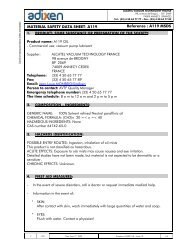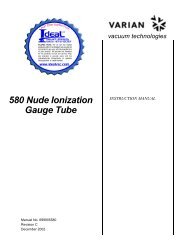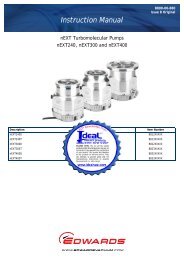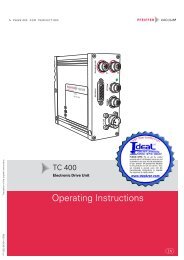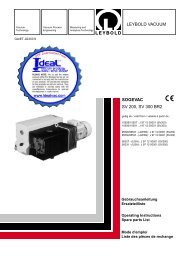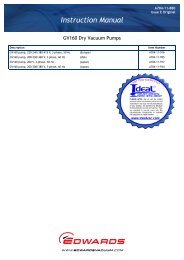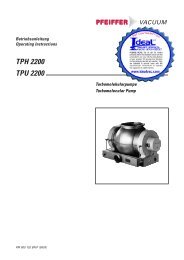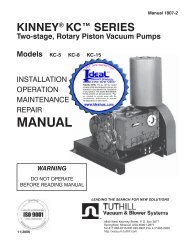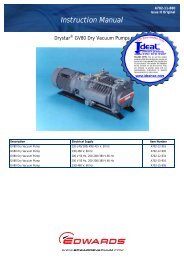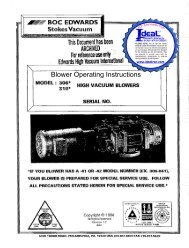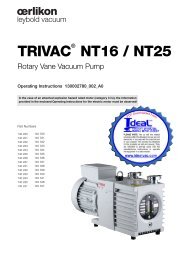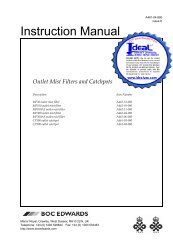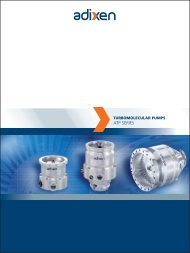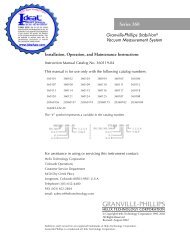VHS-4, VHS-6 and VHS-250 Diffusion Pumps - Ideal Vacuum ...
VHS-4, VHS-6 and VHS-250 Diffusion Pumps - Ideal Vacuum ...
VHS-4, VHS-6 and VHS-250 Diffusion Pumps - Ideal Vacuum ...
Create successful ePaper yourself
Turn your PDF publications into a flip-book with our unique Google optimized e-Paper software.
Explosion<br />
xvi<br />
<strong>VHS</strong>-4, <strong>VHS</strong>-6 <strong>and</strong> <strong>VHS</strong>-<strong>250</strong> <strong>Diffusion</strong> <strong>Pumps</strong><br />
Operation of the diffusion pump without continuous evacuation below 0.5 Torr (0.67 mbar)<br />
or without coolant, <strong>and</strong> then introducing a strong oxidizer (such as air), explosive vapors,<br />
powders, or materials which may react with pumping fluids in a hot pump (above 300 °F or<br />
150 °C) can cause an explosion. Such an explosion would violently expel valves <strong>and</strong> other<br />
hardware, slam open doors that are not designed for appropriate pressure relief, or burst<br />
other components of the vacuum system. Serious injury or death could result from expelled<br />
parts, doors, shrapnel, <strong>and</strong> shock waves.<br />
Avoid the implementing the following three elements that could result in an explosion:<br />
❑ Fuel<br />
❑ Oxidizer<br />
❑ Ignition<br />
A combination of temperature <strong>and</strong> pressure can be a source of ignition. Most diffusion<br />
pump fluids, except mercury, are fuels. Hydrocarbon oils are more prone to oxidize <strong>and</strong><br />
explode than synthetic silicone-based oil. The oxidizer can be air, which is a strong oxidizer<br />
that is introduced by a leak, deliberately brought in via a process, or inadvertently admitted<br />
by an operator or by a process controller error.<br />
Explosion <strong>and</strong> Fire from Acetone <strong>and</strong> Alcohol<br />
<strong>Diffusion</strong> pumps are typically cleaned with acetone <strong>and</strong> alcohol. When combined with<br />
air, oxygen, <strong>and</strong> other oxides, alcohol <strong>and</strong> most other solvents are very flammable <strong>and</strong><br />
explosive. Never permit any trace of these cleaners to remain in or on the pump. Remove<br />
all traces of alcohol <strong>and</strong> acetone <strong>and</strong> other cleaners with clean, dry, oil-free compressed air.<br />
Oxygen <strong>and</strong> other strong oxidizers are even more dangerous than air. Certain conditions<br />
of temperature <strong>and</strong> pressure can cause a combustible mixture to explode. The larger the<br />
diffusion pump, the greater the risk of explosion <strong>and</strong> the greater the risk of damage <strong>and</strong><br />
injury. Never operate large diffusion pumps utilizing hydrocarbon oils without a complete<br />
safety analysis for the entire system <strong>and</strong> for the application.<br />
Never operate a large diffusion pump under the conditions listed in the following table.<br />
Any of these situations increases the probability of an explosion.



